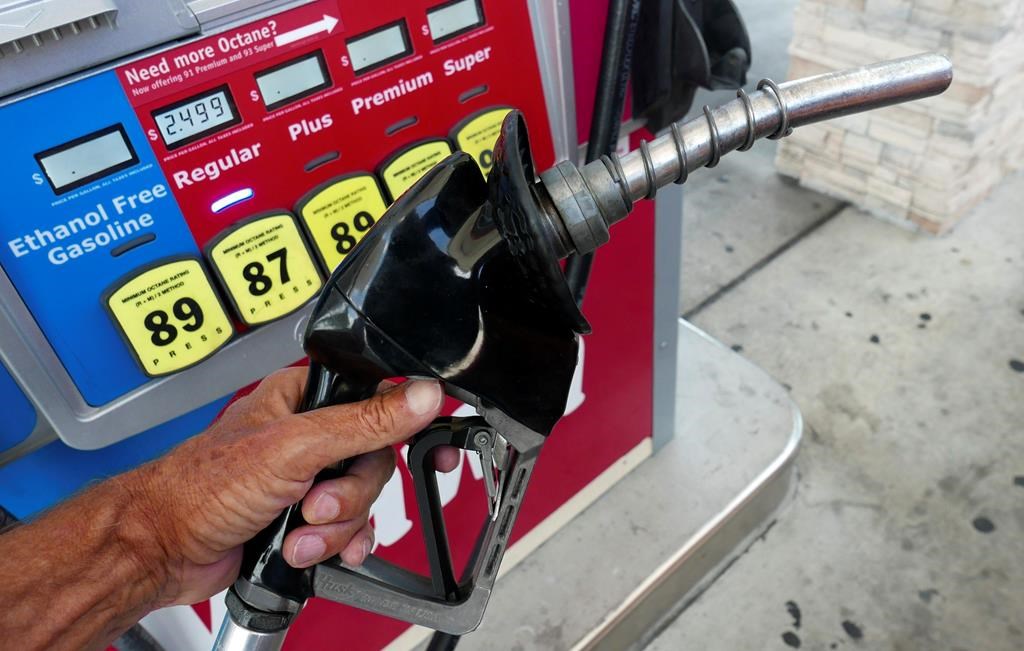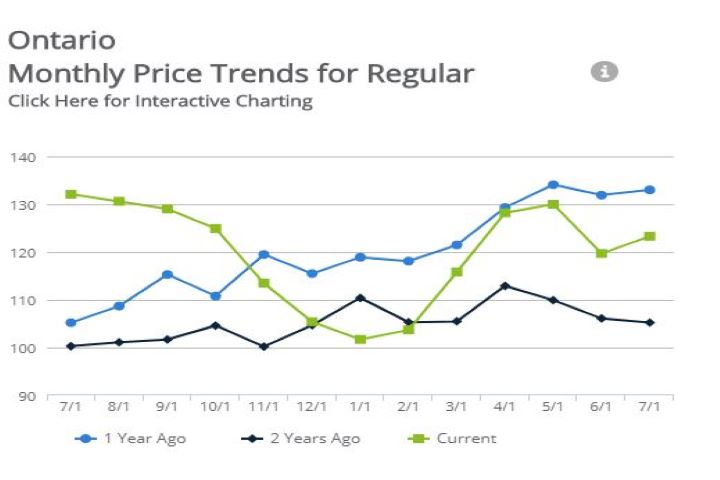Nearly half of Ontarians surveyed in an Ipsos poll conducted for Toyota Canada indicated they’re less likely to take a road trip this summer due to rising gas prices.

The same survey found that 44 per cent of Ontarians are very likely or somewhat likely to take a vacation involving extended driving this summer and that 79 per cent of Ontarians include estimated fuel costs when budgeting for a road trip.
But in Ontario, gas prices this summer are lower than what they were last year, with some fluctuations possible in the near future, according to analysts.
“It doesn’t look like we’re going to have a very expensive summer, certainly not one that rivaled what we saw last year,” Dan McTeague, senior petroleum analyst at GasPriceWizard.com, told Global News.
“I can look maybe two weeks ahead and say we’re going to be within three cents of where we are, up or down.”
From May 3 until about June 16, gas prices fell, said Patrick DeHaan, head of petroleum analysis at GasBuddy. “They’ve been up and down, but certainly they stand lower than where they were just a couple months ago,” he added.
DeHaan said Ontario’s gas prices could see a bit of a downward trend over the next few weeks.
“I think that prices will probably stay between, say, $1.15 to $1.25 a litre for the rest of the summer, barring any unpredictable events.”
There are a number of factors that could affect gas prices in Ontario for the rest of the summer, according to analysts.

Get breaking National news
“Some of the biggest issues affecting the price of oil this summer have been U.S.-China trade tensions,” DeHaan said. “Some of the recent of the increases have been the escalation of tensions between the U.S. and Iran.”
According to McTeague, markets are in panic. “They think there’s going to be a global recession because of a drop in demand for oil and gasoline and other products because of these trade fights between the United States and China in particular, but other ones as well.”
Brexit is another factor that could influence fuel prices, McTeague said.
“A cold departure could lead to further reduction in trade,” McTeague added. “Where you see trade slowing down, you also see those countries not buying as much fuel.”
WATCH: Highest gas prices ever in a North American city are in B.C.

According to DeHaan, hurricane season could also have an impact on prices.
“Hurricanes can and have disrupted oil refineries in the United States in prior years. That remains an issue that could keep prices higher than they otherwise may be,” he said.
Gas prices tend to be higher in the summer, mainly because demand is higher and much of the country uses more expensive gas during that time, DeHaan said.
“You could say that downward demand really begins kind of the first week in August,” he added. “Most of the road trips, most of the vacations that we see are in July.”
According to McTeague, gas stations in major Ontario cities have been discounting their retail margins by at least five cents per litre.
“In other words, we’re getting a benefit that we didn’t have this time last year, where not for that benefit, we’d be paying pretty much the same as we were paying this time last year,” he said.
DeHaan said he doesn’t think Ontarians will see gas prices rise above $1.30 per litre for the rest of the summer.
“I don’t really think Ontarians have much to be too concerned about,” he said. “I don’t think we’ll get much higher than that.”
WATCH: Keeping the peace on your road trip

Methodology: These are the findings of an Ipsos poll conducted on behalf of Toyota Canada between May 3 and 6, 2019. For this survey, a sample of 2,005 Canadians over the age of 18 from the Ipsos I-Say panel were interviewed. The precision of online polls is measured using a credibility interval. In this case, the results are accurate to within +/- 2.5 percentage points, 19 times out of 20, of what the results would have been had all Canadian adults been polled. The credibility intervals are wider among subsets of the population.









Comments
Want to discuss? Please read our Commenting Policy first.